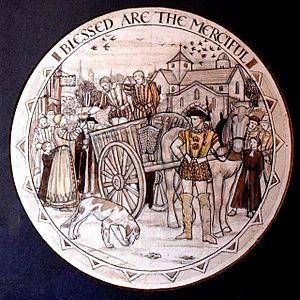James Duckett facts for kids
Quick facts for kids James Duckett |
|
|---|---|

Detail of a stained glass window in Tyburn Convent by Margaret Agnes Rope
|
|
| Born | Gilfortrigs, Skelsmergh, Westmorland, England |
| Died | 19 April 1602, Tyburn, Middlesex, England |
| Venerated in | Roman Catholic Church |
| Beatified | 15 December 1929, by Pope Pius XI |
| Feast | 19 April |
| Patronage | Booksellers, Publishers |
James Duckett (died 19 April 1602) was an English Catholic layman. He was a martyr, meaning he died for his religious beliefs. He was executed in London for printing Catholic books.
Contents
Life and Faith
James Duckett was born in Gilfortrigs, England. We don't know his exact birth date. He grew up as a Protestant, which was the official religion in England at the time.
Becoming a Catholic
While learning to print books in London, James read a book called The Foundation of the Catholic Religion. A friend lent it to him. After reading it, James decided to become a Catholic. This was a brave choice because Catholics faced difficulties in England back then.
Facing Imprisonment
James was sent to prison twice for not attending Protestant church services. His boss helped him get out both times. However, his boss then asked him to find another job.
An old priest in prison helped James officially join the Catholic Church. Around 1590, James married a Catholic widow named Anne Hart. For nine of their twelve years together, James was in prison because of his faith. Their son later became a monk and wrote down much of his father's story.
James worked as a tailor, making clothes and special items for priests. He also helped spread Catholic books.
Printing and Arrest
Authorities searched James's house and found a printing press. They also found copies of a Catholic book called Our Lady's Psalter. Because of this, James was sent to prison again. He spent two years in Newgate Prison before being released on bail.
His house was searched again ten weeks later. James managed to escape at first. But he later turned himself in to protect those who had helped him get bail. He was sent back to prison. He was briefly released when his wife was having a baby. But he was arrested again for sending some English and Latin primers (basic school books) to a bookbinder. He was released once more with the help of two important people.
Betrayal and Trial
Finally, a bookbinder named Peter Bullock betrayed James. Bullock did this to get himself out of prison. On March 4, 1602, James's house was searched. He was arrested for having 25 copies of Catholic books by Father Southwell. He was immediately sent to Newgate Prison.
At his trial, Bullock said he had bound many Catholic books for James. James admitted this but denied other false accusations. The jury first said he was not guilty. But the judge, Sir John Popham, pressured the jury. They changed their minds, and James was found guilty of a serious crime.
Execution at Tyburn
On April 19, 1602, James Duckett was taken to Tyburn, a place where people were executed. Peter Bullock, the man who betrayed him, was also taken in the same cart.
James's son, John Duckett, later became a monk. He shared a story about his father's last journey. James was offered a cup of wine. He drank it and told his wife to drink to Peter Bullock and forgive him. She didn't want to at first, but James gently insisted until she did.
When they arrived at Tyburn Tree, James hugged Bullock. He begged Bullock to die as a Catholic, but Bullock refused. Three priests were also condemned at the same trial. Their executions happened the next day.
James Duckett was recognized as "Blessed" by Pope Pius XI on December 15, 1929. This means he is honored by the Catholic Church as a martyr.
Patronage
James Duckett is considered a special helper or "patron" for booksellers and publishers.

